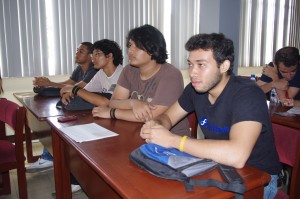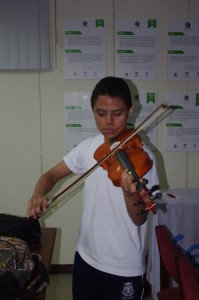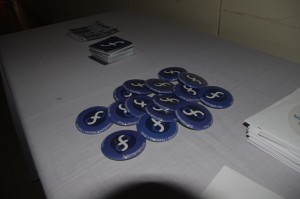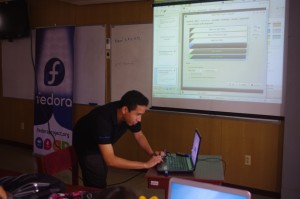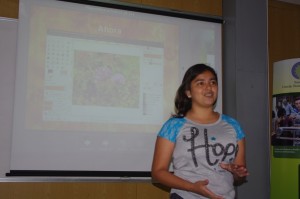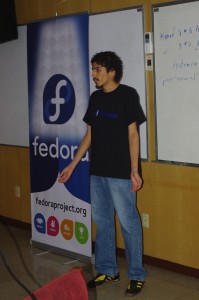Alex Oviedo wrote an invite letter for getting mi visa to Peru. He said that Fedora made FUDCon to gather the brightest minds of Open Source and Free Software. I think that is a bit exaggerated to claim that I am one of brightest minds. I sure the rest of the people that I met in Cusco are the brigthest. Having expend some days with those bright people and not review what I have learn will be a waste. Some of the things that I got to know were things that I have never asked, some are problems to ponder, some other were issues that just happened on the event. I put all those ideas as they come to my mind, and not in order of importance.
FUDCon LATAM has had some troublesome history, so as LATAM we should not take for granted FUDCon. We can no be absolutely sure that there will be more FUDCon LATAM to come. Although we have to thanks Cusco team for giving us a memorable event to be used as reference to validate FUDCon LATAM. As LATAM we need to work to make FUDCon LATAM a must.
FUDCon LATAM has copied the barcamp style of FUDCon NA. We discussed that we should rethink the structure of the event to suit better our audience. We did not have time at Cusco to change the structure, but we introduce changes to cope with more than 800 people present at the event. At least we started ponder the issue.
New FUDCon LATAM should focus on clear objectives. First and most important of all, obtain new collaborators. Second, get things done. We have to produce something useful for Fedora. Even plans for actions are as good as other products. We should expect translation, design, documentation, packaging, new software, infrastructure patches and even infrastructure requests. Anything.
For example, LATAM need to work out logistics. Swag, media and sponsorship need to flow better. That’s not new, but know we are committed to work it out for those that are working for Fedora instead of trying to sort out all Latin American issues. That is a working agreement. That’s is a product.
Third, event projection. Publicity is good, number of people attending is great, but all this comes third. Been on TV announcing the event and talking about Open Source and Free Software, as well talking about Fedora is great. I really, really, don’t want to dismiss the wonderful work that Cusco team did. They are rock starts.
But I keep thinking, if we can make a FUDCon with fifty people, that produce twenty five collaborators and do plenty of work, with no presentations…it may be the best FUDCon of all. It will cost less, produce more, hence it will be efficient. So we need to learn how to identify those people on the edge of collaboration that need a little push. Invite them to FUDCon and provide them with the opportunity.
If we can afford inviting people, we should try get need blood. This is an after thought of mine. We discussed about how other communities in LATAM have fade because of lacking new people replacing those that life takes them elsewhere. Putting new people on stage will encourage them. I understand that it is a challenge to select someone that has not much mileage on the project. But at lest we should consider. There is a tremendous value in face to face contact. We need to foster a new generation. Get the new contributors to know people, and also get them to be known.
Other issue discussed was how we appreciated the Fedora Badges. They are showing us more about what a collaborator do. It is a quick glance of what one person has done. Not perfect, because you will not able to tell the quality of that work, and you can not tell for some areas, like ambassadors work (yet). But in any case is a starting point to evaluate people that is requesting sponsorship. At last, it is up to every one to project it self to be worth of sponsorship. When validating a request, people can only base on what is documented, mostly on blogs and wiki. So spread the word… You want Fedora to sponsor you, then write what you do in your blog. It will be wonderful to have a system that records our actions for fedora and showed on a graph automatically with attention to quality. But that is daydreaming.
One struggle we face was Internet. We need to be prepared to work out Internet infrastructure at lodging and at conference center. We should bring gadgets and be bold about setting up a minimal network. We can hurt people’s work if we show that any guest at the hotel can fix things. Of course, we are not an average guest, but not everyone know that. But showing respect for the hotel staff does not mean that we can not work our own network. Most time there are people arriving days early at the event, we need them to work some how minimal internet connectivity for the rest of the team. Work in group to share a working network for all.
Of course that I helped as I could during FUDCon Cusco 2013. I did my talks, engage with people at the event to motivate them about Free Software and specially Fedora, discuss pressing issues with my fellow collaborators, have “soroche”, drank coca tea, went to Machupichu, refused to eat “cui”, took a lot of pictures and had fun. But you can see all that in other’s people blogs, maybe later I do such a post myself. I wanted to share my perspective, probably incomplete. I hope that others fill in what I have missed.






